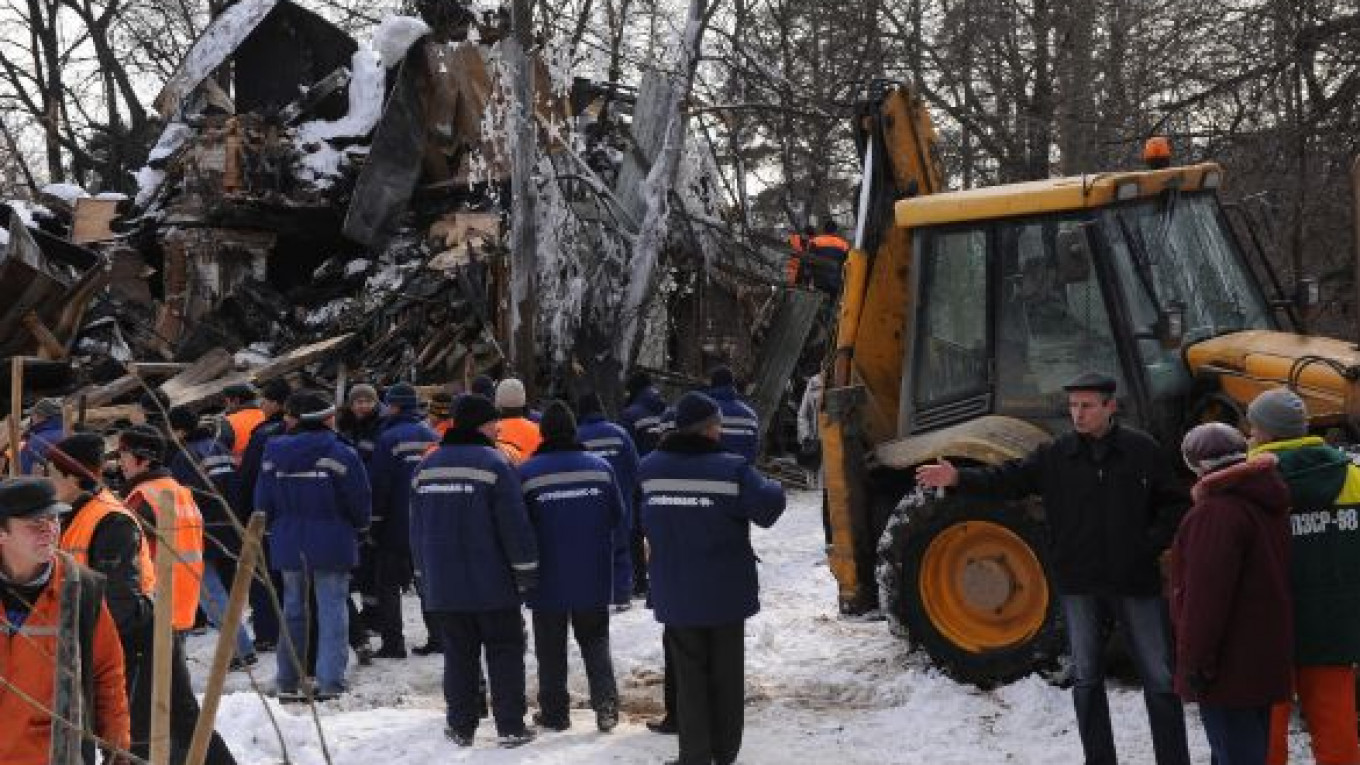Bulldozers have destroyed the Muromtseva dacha in Tsaritsyno after a dawn raid by police and a demolition crew, just over two months after a mysterious fire gutted the building.
The dacha, which the city government has been threatening with demolition for years, was built on the site of the dacha of Sergei Muromtsev, chairman of the first State Duma, and was a cultural landmark with connections to a number of cultural figures including Nobel laureate Ivan Bunin and poet Venedikt Yerofeyev. It was also, until the fire, home to more than six families.
Bulldozers escorted by a police unit and OMON riot police arrived at 6:30 a.m. on Sunday to officially “remove construction debris,” which, as locals found out, entailed knocking down the dacha.
It was an “illegal operation,” said Kirill Boldyrev, 24, whose family had lived in the building since the 1930s. He said police wearing masks “refused to identify themselves or show us any documents.”
As they forced the tenants off the property, Boldyrev said, police pushed two women from the second floor, and the two are now in a hospital.
Footage broadcast on state-run television channel Vesti-24 showed demonstrators being dragged away from the dacha by masked OMON riot police. Ten protesters were detained and later released.
City Hall has said it would build a municipal parking garage for snow ploughs on the site, but residents are skeptical and convinced that some other kind of construction will take place on the valuable real estate.
The razing comes not long after the knocking down of dachas built at the Rechnik settlement in Moscow, which was halted after a public outcry.
Ownership of the Muromtseva remains unclear. A court hearing scheduled for Feb. 25 in the Nagatinsky Regional Court was moved to March 15 after the public defendant did not show up, Boldyrev said. Even though the dacha is demolished, Boldyrev said he hopes to win the court case.
Natalya Samover, a member of architectural preservation group Arkhnadzor, also called the razing illegal.
“The only document that we are told exists, but was not shown on Sunday, is an order from the local prefect to remove rubbish,” she said.
As well as knocking down the dacha, the demolition crew also dismantled the banya, where families had moved to after the dacha was hit by fire on Jan. 3.
Residents told The Moscow Times last year that local police had hinted that the dacha could burn down if they did not move out. Mysterious fires are not uncommon in historical buildings, and preservationists say it is often a strategy to clear out a site so that more profitable construction can take place.
Arkhnadzor says it will re-petition the city’s Committee for the Protection of Cultural Heritage to add the dacha plot to a list of protected cultural sites.
“If [the petition] is successful, the dacha might be rebuilt and could house a museum commemorating the Soviet artists and writers that lived in it,” Samover said. Residents set up a small museum in the house last year, but some of the artifacts were lost in the fire.
In January, Moscow Mayor Yury Luzhkov dismissed opposition politicians’ calls for an investigation into the dacha fire, calling the building a “cabin” and disputing its cultural significance.
Financial newspaper Vedomosti said in a front-page editorial Tuesday that the dacha demolition was part of a series of disputes between society and local and federal powers over construction, such as the controversial Okhta Center skyscraper in St. Petersburg and Rechnik, which show “the weakness of the law and the strength of the powers that be. Historical monuments are defenseless before the desire of bureaucrats.”
A Message from The Moscow Times:
Dear readers,
We are facing unprecedented challenges. Russia's Prosecutor General's Office has designated The Moscow Times as an "undesirable" organization, criminalizing our work and putting our staff at risk of prosecution. This follows our earlier unjust labeling as a "foreign agent."
These actions are direct attempts to silence independent journalism in Russia. The authorities claim our work "discredits the decisions of the Russian leadership." We see things differently: we strive to provide accurate, unbiased reporting on Russia.
We, the journalists of The Moscow Times, refuse to be silenced. But to continue our work, we need your help.
Your support, no matter how small, makes a world of difference. If you can, please support us monthly starting from just $2. It's quick to set up, and every contribution makes a significant impact.
By supporting The Moscow Times, you're defending open, independent journalism in the face of repression. Thank you for standing with us.
Remind me later.


